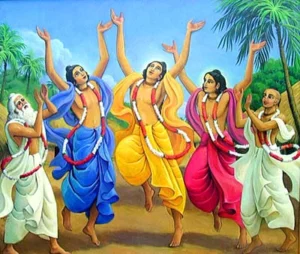A. In Srimad Bhagavatam (3.25.25) it is written:
satam prasangan mama virya-samvido
bhavanti hrt-karna-rasayanah kathah
taj-josanad asv apavarga-vartmani
sraddha ratir bhaktir anukramisyati (36)
Talking about the pastimes and activities of the Supreme Lord in the company of pure devotees is very pleasurable and satisfying for the ear and the heart. By cultivating this knowledge, one gradually advances on the path of liberation, one is freed from all material conditioning and the attraction for the Lord becomes stable. Then one gradually reaches sraddha (attachment), rati (bhava) and bhakti (prema-bhakti).
How to associate with devotees is mentioned in Upadesamrta (5):
krsneti yasya giri tam manasadriyeta
diksasti cet pranatibhis ca bhajantam isam
susrusaya bhajana vijnam ananyam anya-
nindadi-sunya-hrdam ipsita-sanga-labdhya
One should mentally honor the devotee who chants the holy name of Lord Krishna, one should offer humble obeisances to the devotee who has undergone spiritual initiation (diksa) and who is engaged in the worship of divinity, and one should associate and serve with faith the pure devotee who has advanced in pristine devotional service and who has a heart completely devoid of the tendency to criticize others.
Such a pure devotee sees everyone as Krishna’s eternal servants.
One should spend one’s life in the feeling of yukta-vairagya and chant the holy name. As stated in Bhakti-rasamrta-sindhu:
anasaktasya visayan
yatharham upayunjatah
nirbandhah krishna-sambhandhe
yuktam vairagyam ucyate
When one has no attachment, but at the same time accepts all that is related to Krishna, one correctly places oneself above the sense of possession.
Srimad Bhagavatam (7.11.32) also says:
vrttya sva-bhava-krtaya
vartamanah sva-karma-krt
hitva sva-bhava-jam karma
sanair nirgunatam iyat
If a person exercises his profession based on the influences of nature and gradually abandons these activities, he reaches the level called niskama.
Free from sin, one must take refuge in the holy name. This art of living is mentioned in Srimad Bhagavatam (11.7.39):
prana-vrttyaiva santusyen
munir naivendriya-priyaih
jnanam yatha na nasyeta
navakiryeta van-manah
A learned sage should be satisfied in maintaining his own existence and should not seek satisfaction through material sense gratification. In other words, the material body should be dealt with in such a way as not to compromise the highest knowledge and not to deviate from spiritual realization either with speech or with the mind.
Useless activities must be avoided. In this way one can give up the tendency for sense gratification and nourish oneself in such a way that the language and the mind do not deviate from yuktavairagya.
This is a section of the book “Bhajana Rahasya”, by Bhaktivinode Thakura.
To buy the complete book, click above




Leave a Reply